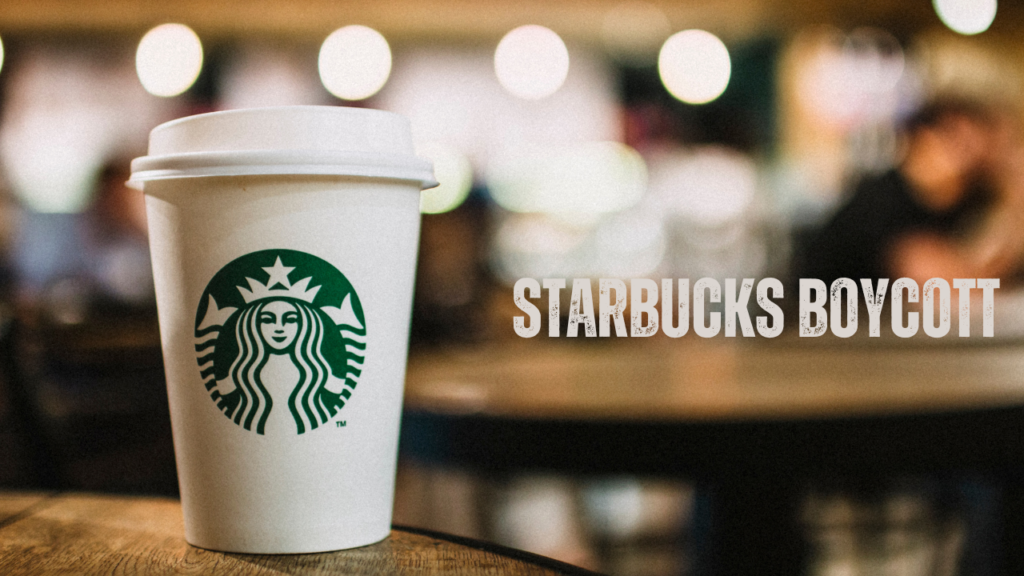Why is Starbucks being boycotted by People?
In a surprising turn of events, Starbucks, the global coffee giant, has witnessed a staggering drop of approximately $12 billion in market value over the past month. The decline is reportedly attributed to a notable slowdown in sales, a consequence many believe is linked to increasingly constrained consumer budgets.The economic challenges posed by tighter budgets seem to have taken a toll on Starbucks’ financial performance. As customers navigate a landscape of financial uncertainties, the demand for premium coffee experiences appears to be waning, impacting the company’s bottom line.
However, beyond economic factors, there’s a cloud of speculation surrounding Starbucks, suggesting that the Israel-Gaza conflict has cast a shadow on the brand. Some observers contend that the company is facing negative repercussions from a purported boycott associated with its perceived stance or actions related to the conflict.Starbucks, known for its ubiquitous presence and cultural significance, is now grappling with a complex intersection of economic constraints and geopolitical sensitivities. The $12 billion market value dip serves as a stark indicator of the challenges faced by even the most established players in the global market.As the coffee giant navigates this tumultuous period, industry analysts and consumers alike are keenly watching to see how Starbucks adapts its strategies to weather the storm, maintain consumer trust, and regain its financial footing in an increasingly volatile market.
In the wake of the Israel-Hamas conflict over the past two months, protests targeting businesses perceived to support Israel have surged, driven by a constant stream of social media activism. Calls to action on various platforms have linked real-time global events with protests against multinational corporations. McDonald’s and Starbucks have frequently become the focal points of these calls, facing allegations of having ties or providing support to Israel. The dynamics of these protests underscore the potent intersection of real-world conflicts and digital activism, shaping consumer behaviors and influencing perceptions of corporate responsibility on a global scale.
ABOUT STARBUCKS
Starbucks Corporation, headquartered in Seattle, Washington, stands as a transnational American coffeehouse chain, holding the distinction of being the largest global network of coffee cafes. With a monumental presence, the corporation boasted a staggering 35,711 stores across 80 countries as of November 2022, an empire that includes a substantial 15,873 locations within the United States alone. Starbucks has been a transformative force in the coffee industry, playing a pivotal role in the emergence of the second wave of coffee culture. Through its widespread influence, the brand has expanded the scope of coffee experiences, introducing a diverse range of offerings that go beyond the conventional cup of joe.
At the heart of Starbucks’ success is its commitment to providing a comprehensive and immersive coffee experience. The menu at Starbucks encompasses an extensive array of beverages, catering to diverse tastes and preferences. From the robust and invigorating espresso shots to the comforting warmth of caffe lattes, Starbucks has redefined the coffee landscape. Moreover, the corporation extends its offerings beyond beverages, featuring a variety of whole-bean coffee, delectable cakes, snacks, and even trendy Frappuccino drinks that have become synonymous with the Starbucks brand. With its pervasive influence, Starbucks continues to shape and evolve global coffee culture, leaving an indelible mark on the way people around the world engage with and savor their coffee.
In essence, Starbucks’ story is one of innovation, expansion, and a commitment to delivering more than just a cup of coffee—it’s about providing a holistic and engaging experience that has resonated with millions worldwide, marking Starbucks as a key player in the coffee industry’s ongoing evolution.
